Every Sunday from 11am until 1pm HST, viewers from across the islands, the nation and the world join Melveen Leed’s Facebook livestream. Leaving their daily cares behind, they are uplifted by the singer’s distinctive voice and her words of wisdom, spiced up with humor and “Moloka‘i Tita” sass.
By casting her throw net worldwide, Melveen offers the opportunity to recall earlier, simpler times; or the glamorous era of hotel and Matson cruise ship showbands, revues and show rooms, and the beginnings of Hawaii Five-0, where she appeared regularly as guest. Younger generations get the chance to see and hear the artist whose albums their parents and grandparents cherish.
All are caught up in the magic, fun and — most importantly — the healing power of music.
Standing on a rock
Melveen learned how to make, mend and throw nets from her maternal grandfather on Moloka‘i. To this day, she packs her shorts and a net she made herself on visits to the Friendly Isle. The strong foundation in life that her grandparents gave her is the rock she has stood upon through good times and bad, with her eyes on a sea of possibilities stretching to the horizon and beyond.
Melvina, as she was named by her grandmother, was born in 1943. Because my mother was only 17 years old and too young to raise me, my grandmother arranged a marriage for her to give me a name. He was from Tacoma, Wash., in the Navy, but she didn’t love him.” Hazel (“Didi”) was hiding herself and her child at different family member’s homes in Honolulu, “so my grandparents came and took me off her bed and straight to Moloka‘i and raised me. And I’m glad they did that, because if I were living with my mother, I would have lived a different life. Very different. She was too young to raise a child.”
Her grandparents, William and Dora Place, lived at the East End of Moloka‘i and had 11 children. William was the breadwinner, working for Maui County as a mechanic. He was self-taught, but considered one of the top mechanics on the island. Dora was a homemaker. “She taught me housekeeping. She taught me how to cook. She taught me how to be neat. She taught me how to fend for myself. My grandfather taught me how to fend for myself, too. He taught me how to clean yard; how to garden.” Melveen’s aunts and uncles were like siblings to her. Aunt Rhoda became especially pivotal in her life.
Childhood on the Friendly Isle
Melveen grew up in a time when children were expected to do chores. But in their free time “we went outside a lot to play, ride bikes, run with friends, and play hide and seek and chase master. We climbed trees like monkeys with ease,” she wrote in a recent Facebook post. They played marbles, tic tac toe, steal the flag, hopscotch and even “stuck cans to our feet with glue that was a sticky bean from a bush.”
Melveen graduated from Kilohana School in 1959. “I had an award — American Legion Award, which is a very high award. I was an A-student. And I was valedictorian for my graduating class.” Her time at Kilohana was another formative experience in her life because it provided opportunities to perform for people other than her family and the friends who visited her grandparents.
She had been entertaining them since the age of three, when William made her a “tiny little ‘ukulele,” says Melveen. “He played the key of C. I looked at his hands, he passed me the ‘ukulele; I played C. He played G7, then put my little, tiny fingers on my uke and I played G7. Then I started singing. That’s how it all started.” By ear, Melveen taught herself how to play piano on the one at the school. To this day, she favors the key that her grandfather first taught her — the key of C.
In a 1984 interview archived on the Hawaiian Music Heritage Series website, she recounts the advice given her by Mr. James Lee, the principal of Kilohana School: “Melvina, if it’s from the heart, it reaches the heart.” That advice still resonates as she does her Facebook livestream. “I like music. That’s why on my show I do music that is pleasing to the ear; that is healing to the heart. That is why I’m doing this.”
Adrift in Honolulu
Melveen’s grandparents always sent her to Honolulu to spend holidays and summers with her mother and stepfather. She lived with them while attending Radford High. It was an unhappy time — so much so, that she couldn’t study and got bad grades. “I barely made it. However, I did graduate. The only thing I had good grades in was shorthand and English class.”
When she turned 18, Melveen moved out of their house and went to live with her aunt in Honolulu for a short while. Then she returned to Moloka’i, adrift in a sea of low self-esteem and not knowing what to do next. Her grandfather would have none of that attitude. “I didn’t raise you to be like that. You better know what you’re gonna do, he told me, because it’s your future. You’re going to get a good job, so you need a good education. I’m sending you to Honolulu to stay with your Aunt Rhoda and you’re going to go to Honolulu Business College (HBC) and take accounting. You can do it; I know you can.”
The singing secretary
At HBC, she did well in typing and shorthand. “And they liked me because I sang for their programs,” says Melveen. When her uncle and aunt moved to Maui, she transferred to Maui Technical School — the predecessor of the University of Hawai‘i Maui College. She sang and entertained at college events, got a student council award and graduated with an associate’s degree in secretarial science.
Due to her top-notch skills, strong work ethic and effervescent personality, she had no trouble getting work as an executive secretary at enterprises as diverse as the pineapple canning industry on Maui and the newly opened Kahala Hotel (which celebrates its 60th anniversary this year) and the developer Jimmy Wong at Paradise Park on O‘ahu. While working for him, she also began singing with the Berne’ Hal-Mann Dance Band at the Hilton Hawaiian Village Garden Bar.
Able to support herself from her Garden Bar gig, Melveen quit her day job. Toki Anzai, who owned Makaha Records, soon took notice of her. Makaha released “Melveen Leed at the Garden Bar” in 1966, “Give Me Tomorrow” (1968) and “Melveen Leed Sings Today’s Hits” (1969). Billboard said she was “strictly pop, with tunes like ‘Yesterday’ and ‘The Shadow of Your Smile’,” but that Anzai was also developing “Hawaiian songs with a modern beat to appeal to local patrons. Melveen Leed has great promise… as she is a strong performer who works well with chart songs and native material.”
“The Hawaiian Country Girl”
By the mid-’70s, she was working with Bud Dant, a former producer for Decca-Coral Records, who had succeeded Webley Edwards as host of the radio show “Hawaii Calls.” Through his connections with Owen Bradley, legendary Nashville producer for singers like Patsy Cline and Brenda Lee, Melveen made 12 albums on the Lehua label with Bradley’s famed session musicians, the Super Pickers. She was the first Hawaiian to perform at the Grand Ole Opry in Nashville. “I like to be different,” Melveen chuckles. The liner notes for “Melveen: The Hawaiian Country Girl,” released in 1976, describe her as “a beautiful, intelligent and witty entertainer” and “one of Hawaii’s hottest recording artists.”
The stand-out song from her time with Lehua, “Morning Dew,” has a fascinating backstory — and it includes shorthand! Eddie and Myrna Kamae asked her if she would include their expanded English-language version of Larry Kimura’s Hawaiian-only lyrics for “E Ku‘u Morning Dew” on the album she was about to record in Nashville. She’d left the song sheet at home, so she quickly transcribed in shorthand the lyrics from the cassette recording Eddie had given her. In her 1984 interview on the Hawaiian Music Heritage Series website, Melveen recounts, “I read it off of my shorthand notes and it was a one-take. At that time, I was so homesick, so I sang it with all my heart and soul. You could hear a pin drop after. All the guys said together, ‘Beautiful!’” At the inaugural Nā Hōkū Hanohano Awards in 1978, “Melveen: The Hawaiian Country Girl” album and “E Ku‘u Morning Dew” won Best Female Vocalist, Best Hapa-Haole Album, Best Single and Best Song. Melveen’s other albums include three recorded in Tahiti and two recorded with Hawai‘i’s Local Divas. In 2012, she released “I Wish You Love” on her own label, ML Records. It was her first jazz album and won the Nā Hōkū Hanohano Award for Best Jazz Album of the Year.
Pacific voyager
In 1995, Melveen was living in Tahiti. She was married to the boss of a pearl farm and lived on Aratika atoll in the Tuamotu Islands. Skills she’d been taught by her uncles on Moloka‘i came into play once again, as she free dived and spearfished. The breath control she’d built up as a singer enabled her to dive 60 feet. Her sheer determination to prove her husband wrong — he thought she wouldn’t be able to do it — helped!
During the 1980s, Melveen had started making jewelry to give as gifts, and Tahitian shells remain a key part of her artistry. The necklace she wore on the day of our interview “is a history of my life,” she said. Pointing to each component, Melveen explained, “This is from Moloka‘i and this is from Tahiti. I went to Samoa and Tonga — the Philippines. These all mean a lot to me.” Besides her Native Hawaiian and German ancestry, Melveen has identified Portuguese, Korean, Japanese, Tahitian and Marquesan forebears in her genealogy.
In 2018, the Pan Pacific & South East Asia Women’s Association of Hawai‘i honored her with a Lifetime Achievement Award. “Leed has made her marks in myriad of ways in education, television, entertainment, indigenous issues; her philanthropic charity work in the past 50 years; as well as being a positive role model for young people in the Pacific and the USA.”
Other horizons
Melveen’s favorite performance venue isn’t one of the big ones, like the Grand Ole Opry, Carnegie Hall or the Mariinksky Theatre in St. Petersburg, but a small community theatre in Hastings, A¯ otearoa/New Zealand. The Hawkes Bay Opera House was originally built in 1915 but was newly restored in 2006 when Melveen performed there. A “lyric theatre” in a mix of Spanish Mission and Art Nouveau architectural and decorative styles, it has perfect acoustics. “It’s a beautiful theatre,” Melveen says. “I made a whole pageantry there in honor of my very close friend Tommy Taurima.” She brought with her Waipahu’s Ha¯lau Hula ‘O Hokulani. “I had the dancers chant and dance with sticks and spears. They were very good.”
The much-beloved Ma¯ori composer Tommy Taurima had a long association with the Polynesian Cultural Center on O‘ahu, beginning in 1963. His most famous show, “Horizons: Where the sea meets the sky,” ran from 1995 until the end of the 2009 season. For her 2006 show, Melveen wrote a song for him in Ma¯ori. “It’s a song about saying goodbye. Don’t go away. Just stay. I had this book of all the different composers of Ma¯ori music. So I got a line from him and a line from her, and I put the whole song together. It’s a beautiful song called “E Noho Ra.” I had him sit on stage and I sang it to him.” In 2013, Taurima was presented with The Lei Pulama Aloha Living Treasure Award by the PCC. Sadly, he passed away in 2019.
Going with the ‘current’
In 1973, when The Congress of the Hawaiian People and Don Ho produced a concert designed to develop new talent in music and dance, Melveen presented young Little Anthony, as Tony Conjugacion was then known. The recording of their duet, “Iesu¯ Me Ke Kanaka Waiwai,” was one of KCNN1420 radio’s most loved songs through the ’70s and ’80s. Five years earlier, Conjugacion’s mother had brought her 8-year-old to one of Melveen’s rehearsals at the Queen Kapi‘olani Hotel and asked if she would hear him sing. “I invited him to my show that night and featured him to give him a start. The rest is history!”
James Dela Cruz, who formed his Na Opio O Ko‘olau hula ha¯lau in 1981, is another mentee. He sometimes joins her on her Sunday livestream. “He’s like a son to me — calls me ‘Mama Melveen.’ He teaches the tu¯ tu¯ and the young ones at his studio in Ka¯ne‘ohe, and he also has a studio in Japan. In his show at the ‘Alohilani hotel, he teaches the history of Hawai’i.”
The 1973 concert was during the height of the “Hawaiian Renaissance,” a time of controversy about traditional vs. modern forms of Hawaiian performing arts. Asked about today’s music, Melveen says, “One thing I know is you cannot stop progress. Every generation has their own music. Now we have different instruments. The sound is enhanced because of changes to the instruments . I can play slack key on my keyboard!”
The idea to use Facebook Live came to her in 2016, when she was thinking of cutting back on live performances. “If I go on Facebook, I can go worldwide.” She’s been doing her Sunday livestream ever since, and those who join in are indeed from all over the world. The enthusiasm with which she has embraced new technology is no surprise. Enthusiastically adapting to what is available in her current environment, Melveen has transitioned to modern technology both musically and as an artist.
Her living room is a showcase of her wonderfully crafted decorative
shell art, but she has also created many drawings and watercolor paintings on her iPad. All of them display a love of detail and balance, color, light and shade that would be at home in an art gallery anywhere in the world. “I cannot keep still,” Melveen says.
Healing in the key of M
In her tiny home-based studio on Sundays, Melveen uses her keyboard and voice for one purpose: “I don’t do it for stardom. I do it because I know there’s so many people out there who need it. Music is healing.” In her living room is a special area where she lights a candle and prays for people who are sick. Her prayer garden just outside her front door is filled with small, smooth rocks that she decorates with colored felt-tip pens. On each rock, she writes the name of the person she is praying for.
During her 12-year residency performing at the Ala Moana Hotel, Melveen had a phone installed on stage so she could sing to terminally ill patients. Every morning, she would call hospitals to find patients to sing to at that night’s show. The next morning, she’d visit the patient and bring them an autographed copy of “I Love You Hawai‘i.” “I would leave in a shambles knowing I’d never see them again,” Melveen says. Now she takes calls from caregivers and performs their request in her home studio so they can share it with their loved one. Melveen is a Christian, deeply grateful for all the blessings Ke Akua has given her and for the healing that He brings. She believes He has given her this healing mission.
No stranger to health issues, herself, as a teenager, she had rheumatic fever and her Aunt Rhoda watched over her as she lay in a bed of ice. Melveen was diagnosed with leukemia several years ago. “I’ve never experienced anything that brutal in all my life. My poor husband! He took good care of me.” Her illness is not something she shares with her Facebook audience. “I’m not here to tell them about my woes. I want them to heal.” Melveen has been married to Miguel “Mike” Reyes, Jr. for 13 years. “I knew him when I was 15.
He’s a real gentleman and very good looking!” Mike manages many aspects of Melveen Leed Productions, including the YouTube channel, her keyboard and studio equipment, and merchandise.
Closing the circle
Turning 81 in July, Melveen is pulling in her net full of wonderful memories. “Now I just want to relax and enjoy my life — do what I want to do. We stay at home and watch TV or travel. I do an event once in a while. I do my jewelry, and draw and paint. I love to cook. I’ve been married six times, so I learned different recipes from all the mothers.” In turn, she’s taught her daughter and two granddaughters to cook, starting them off the same way her grandmother did when she was a baby — sitting her on the kitchen countertop with her feet in the sink, washing a pot of rice.
Facebook: facebook.com/melveenleed
YouTube: youtube.com/@melveenleedproductions8819/videos
Nā Mele 25 Rewind, PBS, 2024:
youtube.com/watch?v=seRuDIqHXQ0
Click on “Album History” to find a list of her 28 albums:
melveenleed.com
Hawaiian Music Heritage Series, 1984:
http://hawaiianmusicheritageseries.com/leed.html

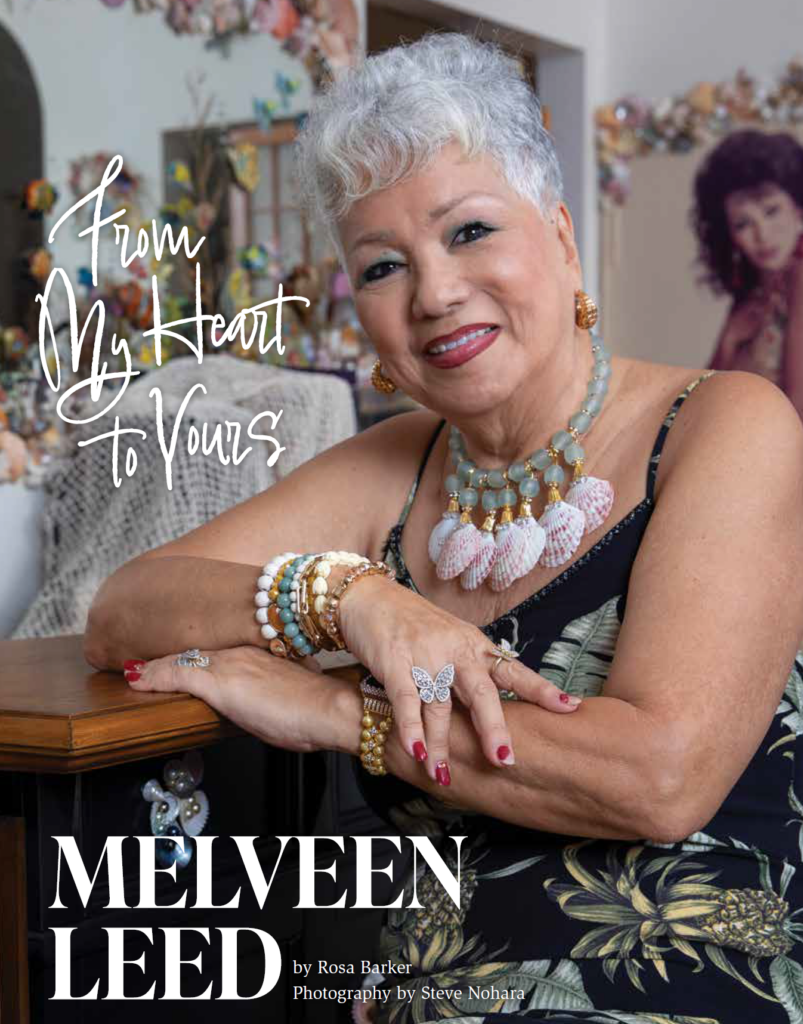

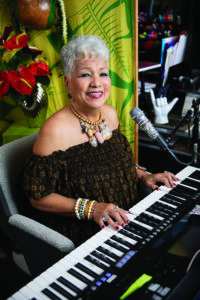
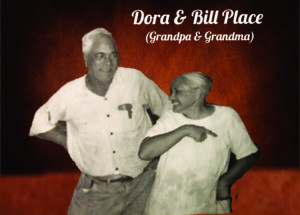
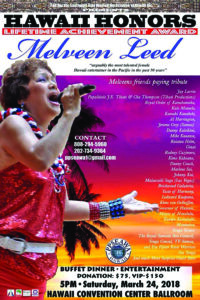
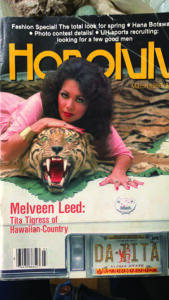
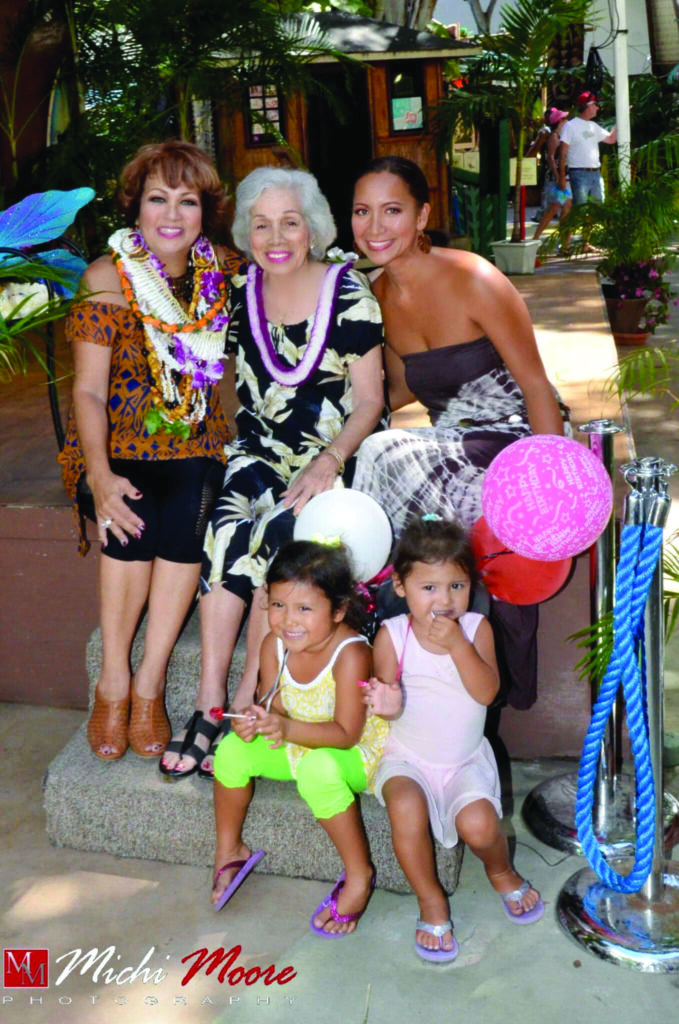
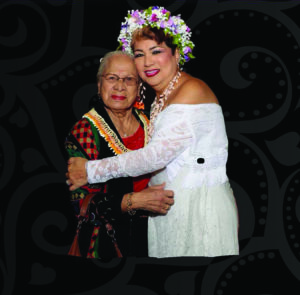


Leave a Reply